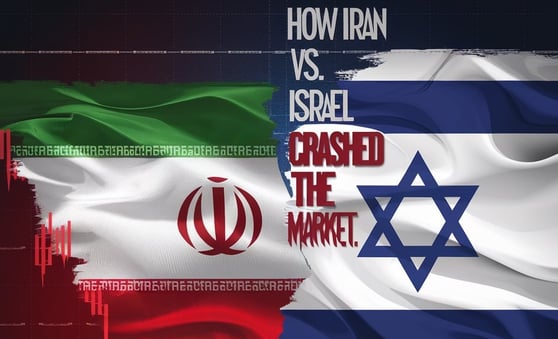Iran-Israel War Crashed the World Stock Market
Tensions between Iran and Israel recently caused a significant drop in global stock markets. Investors sold off stocks due to fears of conflict, rising oil prices, and potential supply chain disruptions, affecting major companies like Exxon, Boeing, and General Electric.
beingMJ
10/6/20243 min read


Iran vs. Israel Crashed the World Stock Market
In our fast-paced world, news travels quickly, and when countries have conflicts, it can cause big changes in the stock market. A recent example of this is the rising tensions between Iran and Israel. This post will explain how their problems led to a drop in stock prices around the world and highlight some companies that were affected.
Background: A Long Rivalry
Iran and Israel have been enemies for many years. Iran is mostly Shia Muslim, while Israel is a Jewish state. Their conflict comes from history, politics, and religion. Recently, tensions increased over Iran’s nuclear plans and Israel’s efforts to stop them, creating a tense situation.
What Sparked the Downturn?
The latest problems began when Iran announced it was making progress with its nuclear program. Israel reacted strongly, and military actions followed. As news spread, investors became worried about the possibility of a larger conflict. This fear led many to sell their stocks, causing a significant drop in market prices.
How the Market Reacted
When tensions rose, major stock indexes, like the Dow Jones and the S&P 500, fell sharply. Several reasons contributed to this reaction:
1. Fear and Uncertainty
Markets do best when things are stable. The threat of war creates uncertainty, which pushes investors to sell their stocks and move their money into safer options, like gold or government bonds.
2. Rising Oil Prices
Iran is a major oil producer. Fears of conflict led to rising oil prices, which can hurt many businesses by increasing costs. While energy companies might benefit, other sectors struggle.
3. Supply Chain Worries
The Middle East is important for global trade. A conflict could disrupt supply routes, affecting many industries. Investors became anxious about these possible disruptions, leading to declines in stock prices across the board.
4. Panic Selling
As news broke, many investors quickly sold their stocks out of fear that the situation could worsen. This rush to sell caused even more declines in the market.
Companies Affected
Several well-known companies saw their stock prices drop due to the rising tensions. Here are a few examples:
1. Exxon Mobil (XOM)
Exxon is a big player in the oil market. Rising oil prices can help them, but the uncertainty from the conflict led to increased market fluctuations, affecting their stock.
2. Boeing (BA)
Boeing, known for making planes and military equipment, faced downward pressure as investors worried about military spending and global supply issues.
3. Lockheed Martin (LMT)
Lockheed Martin is another defense company. While they sometimes benefit from conflicts, the overall fear in the market caused their stock to fluctuate.
4. Chevron (CVX)
Like Exxon, Chevron was affected by rising oil prices. But the overall market worry also led to a drop in their stock.
5. General Electric (GE)
General Electric, which works in aviation and energy, also saw its stock drop due to concerns about supply chain problems and lower demand for their products.
Long-Term Effects
While markets often bounce back from short-term drops, ongoing tensions between Iran and Israel could lead to more instability. Investors might look for safer investments and avoid sectors that could be at risk due to conflicts.
Central banks could also face challenges. Rising oil prices can lead to higher costs for goods, making it harder to control inflation. This balancing act between encouraging economic growth and managing inflation becomes tougher amid such tensions.
Conclusion: The Global Impact
The conflict between Iran and Israel shows how connected our world is. Events in one part of the world can affect economies everywhere. Investors need to be aware that these conflicts can lead to significant changes in the stock market.
Financial markets are influenced not just by economic data but also by political situations. Understanding this connection can help investors navigate changes in an uncertain world. The Iran-Israel rivalry may seem distant, but its impact on stock prices illustrates how intertwined our global economy has become.
Contact Us :
beingaimj@gmail.com
© 2024. All rights reserved.
